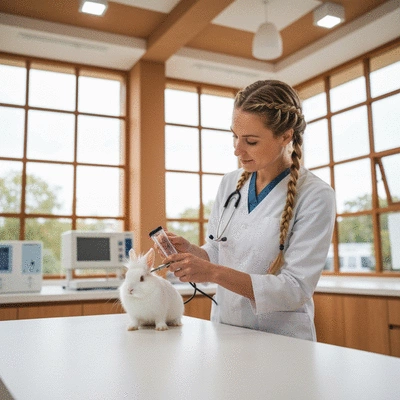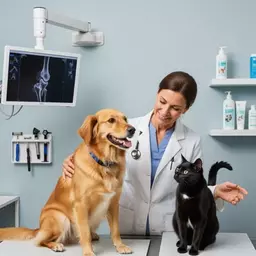Have you ever considered how much behind-the-scenes work goes into the well-being of our furry friends? Animal research is a cornerstone of pet healthcare, driving advancements in diagnostics and treatment options that significantly improve the lives of our pets. This article sheds light on the vital role of research in veterinary medicine and how it fosters trust and innovation in pet care.
What You Will Learn
- Animal research is essential for developing effective diagnostic tools and treatment strategies for pets.
- Innovative technologies like AI are transforming veterinary practices, enhancing the accuracy and efficiency of pet diagnostics.
- Personalized medicine, through genetic testing, enables veterinarians to tailor treatments to individual pets' needs.
- Engaging with recent veterinary research can empower pet owners to advocate for their pets' health and wellness.
The Impact of Animal Research and Technology on Pet Healthcare
Delve into how scientific studies and cutting-edge innovations are transforming veterinary diagnostics and treatments, ensuring better health outcomes for our beloved pets. For insights into the latest developments, explore animal research advances in 2025.
Foundational Animal Research Categories
-
Clinical Trials
(New treatments) 🔬 -
Behavioral Research
(Training methods) 🐾 -
Genetic Studies
(Hereditary diseases) 🧬
AI-Powered Diagnostic Enhancements
-
Data Analysis
(Quicker diagnoses) 📊 -
Image Recognition
(Precise interpretations) 👁️ -
Predictive Analytics
(Foresee disease risks) 🔮
Understanding the Role of Animal Research in Pet Healthcare
Animal research plays a crucial role in enhancing pet healthcare by providing the foundational knowledge that drives diagnostic tools and treatment options. Through rigorous studies, veterinarians and researchers can understand the biology of animals better, leading to more effective healthcare strategies. Have you ever thought about how much behind-the-scenes work goes into the well-being of our furry friends?
At VetInfo World, we believe that educating pet owners about these processes is essential for fostering trust in veterinary medicine. Understanding animal research not only dispels myths surrounding it but also highlights its importance in advancing the standards of care we provide to pets.
Defining Animal Research in Veterinary Medicine
So, what exactly is animal research in the context of veterinary medicine? It encompasses a variety of scientific studies aimed at improving animal health and well-being. This research can include everything from clinical trials for new medications to behavioral studies that inform training practices.
- Clinical Trials: Evaluating the effectiveness and safety of new treatments.
- Behavioral Research: Understanding animal psychology to improve training methods.
- Genetic Studies: Investigating hereditary diseases and their treatments.

By exploring these areas, we can develop better diagnostic techniques and treatments tailored to the unique needs of pets. This research ultimately leads to improved health outcomes and enhances the quality of life for our animal companions.
How Animal Research Supports Pet Diagnostics and Treatments
Animal research is vital for the development of advanced diagnostic methods and treatment protocols. By studying various diseases and their manifestations, veterinarians can identify symptoms earlier, allowing for prompt intervention. This proactive approach can significantly improve prognosis and recovery times for pets.
- Early Detection: Research helps identify biomarkers that signal diseases before symptoms appear.
- Innovative Treatments: Studies lead to breakthroughs in medications and therapies tailored for specific conditions.
- Personalized Medicine: Understanding genetic factors allows for customized treatment plans for individual pets.
As a veterinarian, I’ve seen how these advancements pay off in real-world scenarios. When we leverage research findings, we not only enhance diagnostic accuracy but also provide treatment plans that resonate with each pet's unique health profile. This personalized approach is the future of veterinary medicine! For a deeper dive into these tools, check out veterinary diagnostic tools: a comparison.
Innovative Technologies Transforming Pet Diagnostics
The landscape of pet diagnostics is rapidly evolving thanks to innovative technologies. These advancements not only improve the accuracy of diagnoses but also streamline the process, making it more efficient for both veterinarians and pet owners. Have you ever considered how technology can aid in your pet’s health management?
From artificial intelligence in diagnostic tools to telemedicine options, these innovations are creating a more connected approach to pet healthcare. It's exciting to think about the possibilities that lie ahead!
AI-Powered Diagnostics: Enhancing Accuracy and Predictions
Artificial intelligence is revolutionizing veterinary diagnostics by providing tools that enhance accuracy and predictions. By analyzing vast amounts of data, AI can assist in identifying diseases earlier than traditional methods. Imagine having a tool that can predict potential health issues based on your pet's medical history!
- Data Analysis: AI technologies analyze trends in health data, leading to quicker diagnoses.
- Image Recognition: Advanced algorithms interpret medical images with high precision.
- Predictive Analytics: AI models can foresee disease risks based on various health indicators.
These AI-powered diagnostics not only save time but also improve the accuracy of our diagnoses. As a veterinarian, I find it fascinating how these tools can empower us to provide better health outcomes!
Real-World Examples of AI in Veterinary Practices
There are several practical applications of AI in veterinary practices today. For instance, AI systems can assist in reading X-rays and ultrasound images, helping veterinarians make more informed decisions. Such advancements are not just theoretical; they are actively being used to enhance pet care!
- Radiology: AI algorithms analyze radiographic images for abnormalities.
- Laboratory Testing: AI helps interpret blood test results more efficiently.
- Client Interaction: AI chatbots can answer pet owners' common concerns, improving engagement.

These examples illustrate how AI is shaping the future of veterinary medicine, making our processes more efficient and accurate. The integration of technology in diagnostics is paving the way for a more proactive approach to pet health!
We Want to Hear From You!
How do you feel about the advancements in veterinary medicine and animal research? Share your thoughts below:
Summary of Advancements in Pet Diagnostics and Treatments
As we delve into the world of pet diagnostics and treatments, it's clear that advancements in animal research are paving the way for better healthcare for our furry companions. These developments not only enhance our understanding of pet health but also lead to innovative solutions that can dramatically improve outcomes. At VetInfo World, we've been keeping a close eye on these trends, and it's exciting to see how they translate into real-world benefits for pets and their owners!
Here are some key takeaways from recent developments in animal research:
- AI technologies are being integrated into diagnostics, offering more accurate predictions and timely interventions.
- Telemedicine has emerged as a convenient option for pet consultations, making it easier for owners to access veterinary care.
- Genetic testing is shaping personalized treatment plans, allowing vets to tailor medications and therapies based on individual needs.
- Research into preventive care strategies is helping to identify diseases earlier, leading to more effective management.
These advancements are not just technological; they represent a shift toward a more proactive and personalized approach to animal healthcare. As a veterinarian, I find it inspiring to witness how science is improving the lives of pets everywhere! You can learn more about understanding pet wellness and care.
Getting Involved: How Pet Owners Can Benefit from Research
As a pet owner, you might wonder how you can engage with these developments in veterinary science. It's essential to realize that you have a role to play in promoting your pet's health through research and staying informed about new advancements. Here are some actionable steps you can take:
- Stay updated with the latest veterinary research and treatment options available for your pet.
- Consider participating in clinical trials that contribute to advancements in pet healthcare.
- Utilize telemedicine services to consult with veterinarians for quicker advice and follow-ups.
- Advocate for genetic testing if it aligns with your pet’s healthcare needs, allowing for tailored treatment approaches.
By taking these steps, you are not only enhancing your pet's health but also contributing to a broader understanding of veterinary care that benefits all animals.
Encouraging Ethical Practices in Veterinary Care
As we navigate the ever-evolving landscape of veterinary medicine, it’s crucial to encourage ethical practices within our community. As a veterinarian, I believe in the importance of transparency and ethics in animal research. Here’s how you can help:
- Engage in discussions with your veterinarian about their research practices and how they ensure animal welfare.
- Support organizations that promote ethical standards in veterinary care and animal research.
- Educate yourself and others about the importance of ethical considerations in the health and well-being of pets.
Ultimately, the more informed and engaged we are as pet owners, the better care we can provide for our beloved pets. Client education is key, and by being proactive, we can foster a culture of compassion and responsibility in veterinary care. Together, we can strive for advancements that respect and enhance the lives of animals!
The Importance of Client Education and Pet Owner Engagement
In my experience, one of the most vital aspects of veterinary practice is the relationship between pet owners and their veterinarians. By fostering open communication and education, we can ensure better health outcomes for pets. I encourage all pet owners to ask questions, seek information, and actively participate in their pet's healthcare journey. Remember, an informed pet owner is the best advocate for their furry friend!
Frequently Asked Questions About Animal Research and Pet Healthcare
- Q: What is the main role of animal research in pet healthcare?
- A: Animal research provides foundational knowledge for developing diagnostic tools and treatment options, significantly improving pet health outcomes and advancing veterinary medicine.
- Q: How do innovative technologies like AI impact pet diagnostics?
- A: AI enhances pet diagnostics by offering more accurate predictions, quicker diagnoses through data analysis, precise image recognition, and the ability to foresee disease risks with predictive analytics.
- Q: What is personalized medicine in veterinary care?
- A: Personalized medicine in veterinary care involves tailoring treatments to individual pets' needs, often based on genetic testing and unique health profiles, leading to more effective and specific therapies.
- Q: How can pet owners get involved in their pet's health through research?
- A: Pet owners can stay informed about the latest veterinary research, consider participating in clinical trials, utilize telemedicine services, and advocate for genetic testing when appropriate for their pet’s health needs.
- Q: Why is ethical practice important in veterinary care and animal research?
- A: Ethical practices ensure transparency, animal welfare, and responsible advancements in veterinary medicine. Pet owners can support this by discussing research practices with their vets and backing organizations that promote high ethical standards.
Recap of Key Points
Here is a quick recap of the important points discussed in the article:
- Animal research is essential for developing effective diagnostic tools and treatment options for pets.
- Innovative technologies, such as AI, significantly enhance the accuracy of pet diagnostics and predictions.
- Telemedicine is a convenient option for pet consultations, improving access to veterinary care.
- Genetic testing allows for personalized treatment plans that cater to individual pet needs.
- Pet owners can engage with veterinary research by staying informed and participating in clinical trials.









